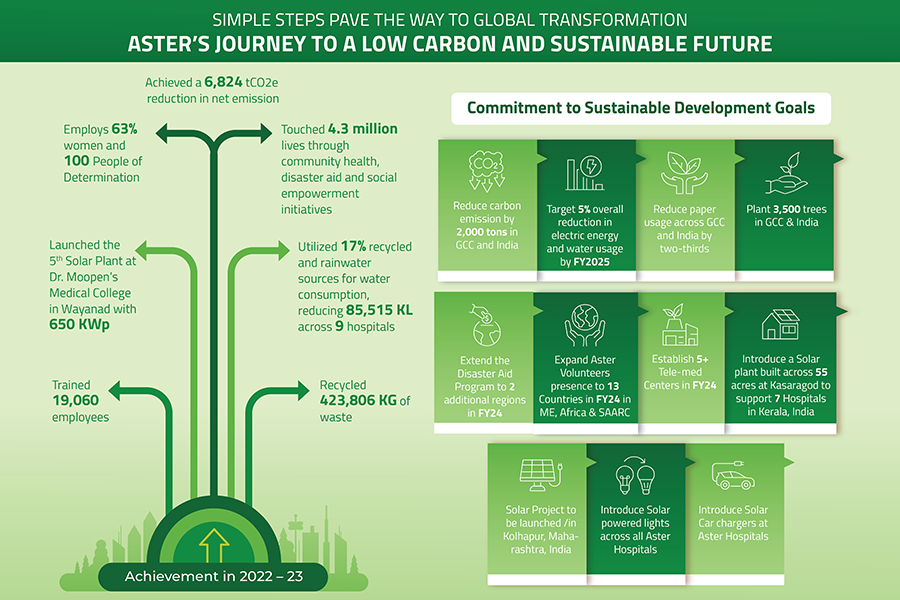
Aster plans to reduce water and electricity consumption by 5% by 2025 in GCC & India
Integrated healthcare provider in GCC and India, Aster DM Healthcare has released its annual ESG Report, which demonstrates its unwavering commitment to environmental sustainability and ambitious targets such as reducing water and electricity consumption by 5% by 2025.
In pursuit of a greener tomorrow, Aster has strategically integrated renewable energy sources, along with optimising water utilisation, waste management and sustainable transport management practices into its day-to-day operations. With integration of renewable energy sources including 3,679,200 KWh solar energy, 2,300,000 KWh wind energy and 3,569,298 KWh hydro energy, the company managed to reduce 6,824 tCO2e in net greenhouse gas emissions, despite significant operational expansion. Decarbonisation initiatives continued across five hospitals, with a new solar plant of 650 kWp commissioned at Aster Wayanad Specialty Hospital – poised to reduce 460 tCO2e per annum.
Water conservation efforts have seen a 17% reduction in consumption across operations, with 85,515 KL water savings achieved through innovative practices, including recycling and rainwater harvesting. Aster’s commitment to responsible waste management has resulted in the recycling of 423,806 KG of waste.
Commenting on the ESG practice, Dr Azad Moopen, Founder Chairman, Aster DM Healthcare said, “At Aster, our commitment to ESG principles is woven into the fabric of our corporate culture. We actively integrate sustainable practices across every vertical of our operations, recognising that our dedication to environmental, social and governance considerations is a fundamental ethos guiding our journey towards a more sustainable and responsible future…We envision setting new benchmarks for environmental stewardship and social impact. Our goal is not just to meet current standards but to continuously raise the bar for excellence in ESG performance.”
Looking ahead, Aster remains committed to advancing its environmental agenda through the launch of a three-year plan. The organisation has placed emphasis on climate change mitigation with a targeted reduction of 2,000 tons of carbon emissions in GCC and India. It also aims to reduce paper usage by two-thirds across the GCC and India, accompanied by the ambitious goal of planting 3,500 trees in these regions. Aster also plans to build a large-scale solar plant spread across 55 acres in Kasargod which would power seven hospitals in Kerala, India. As mentioned earlier, by 2025, Aster plans to reduce overall electricity consumption by 5% throughout GCC and India. In tandem, a parallel commitment to a 5% overall reduction in water usage across these regions by FY2025. Measures like solar powered lights across Aster Hospitals, solar car charging stations are set to be introduced.
Beyond operations, Aster’s corporate social initiatives, including the Aster Volunteers programme, impacted 4 million+ lives through healthcare outreach to the underprivileged in the past year.